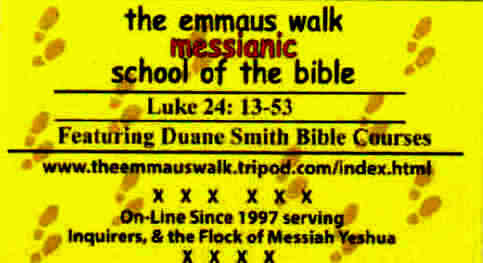
THE EMMAUS WALK PRESENTS:
"Laying a Firm Foundation,"
By Chet Plimpton, NTM Executive Board, in NTM@Work, New Tribes Mission Magazine, June 2009

Cleopas and his fellow travel were downcast and discouraged as they walked the dusty road from Jerusalem to Emmaus on Resurrection day. Like many in Israel, they had such high hopes that the man called Jesus would be the Messiah who would deliver Israel from bondage to Rome.
But now they dared not refer to Him as the Messiah, because He had been crucified three days previous. Now they could only bring themselves to acknowledge Him as having been a great prophet, anointed by God to heal the sick, cleanse the lepers, cast out demons, cause the blind to see, the deaf to hear, the dumb to speak, the lame to walk, even the dead to live again; and perhaps what gripped their hearts the most, was the authority by which He had taught them the Scriptures.
Yes, they had high hopes in Jesus, but those hopes were buried with Him three days before. Even though some of the other disciples had visited the tomb and found it empty, and some claimed angels told them He was alive, their spirits were not lifted.
As they walked along and continued their deep discussion, another man joined them. He began to question them concerning what was making them so sad and despondent. With their spirits melancholy and their eyes downcast, the two disciples did not recognize the Lord but gave the "headline news" in Jerusalem concerning the arrest, trial and crucifixion fo the man called Jesus of Nazareth. It is very notable that the crestfallen disciples concluded their account by saying, "but Him they did not see" (Luke 24:24). The point is, the disciples would have felt a lot better if they or somebody they trusted had only seen Jesus alive and perhaps even touched him.
What follows is one of the most intriguing and revealing conversations in all the Scripture. Why didn't Jesus simply put an end to their bewilderment and confusion and make their spirits soar to the heavens by exclaiming, "Don't be so sad! It's me, Jesus! I'm alive!" Instead of giving the short answer, the Lord did a salient thing. He began with the writings of Moses and the prophets, continuing through all of what we now know as the Old Testament Scriptures. Luke 24:27 says that "He expounded" or thoroughly explained what God's inspired Word had to say about Himself.
Wouldn't you have loved to be on that walk with Jesus? We don't know at what point Jesus joined His two disciples on the road, but if He joined them early in their walk, it probably took them two or three hours to cover the seven miles from Jerusalem to Emmaus.
We can imagine that Jesus perhaps began with the account of creation, especially Genesis 3:15, that speaks of the bruising of His heel or His sufferings and death. Perhaps He explained how Noah's building of the ark, the offering of Isaac, the lifting up of the brazen serpent and all the countless blood sacrifices culminated in His supreme sacrifice and shed blood on Calvary's cross. No doubt He took them through all the prophecies of David, Isaiah, Daniel, and others, concerning His birth and incarnation, His teachings, miracles, sufferings and at last, His glorious and victorious resurrection from the dead.
As eager as Jesus must have been to reveal Himself to these two disciples and make their hearts glad, He knew such action would be premature. He knew their understanding of who He was and why He came to earth was flawed, so He first took the time to lay a scriptural foundation for their faith.
What might have happened had Jesus revealed Himself to the two disciples, without first laying the solid foundation of promises and prophecies from the Old Testament? They were looking for a king to immediately assume earthly power, not a man who came to suffer and die. Would they have continued to hold and pursue their faulty expectations and miss the truth Jesus showed them that He ought to have suffered and died, only to rise again?
Jesus Christ was building His church to be His faithful witness to the world in subsequent ages. The Church of Jesus Christ is meant to endure. And an enduring structure cannot rest upon a flawed foundation. Faith must anchor and rest solely upon the Word of God.

The New Tribes Mission uses the chronological method, to teach the need of salvation first, to reveal what sin is in God's eyes, and then leads the unsaved to the solution, Jesus Christ, whose sacrifice paid for all sin, and which can be entered into and received free, for it is by the free gift of God, grace, that salvation comes to all men, not by works or human goodness. The chronological method should be used for all unsaved souls, not just on the mission fields. We all need to come this way, and gain a firm foundation for the gospel, for the salvation message. Unprepared, without that foundation, countless Christians falter in their walk with God later on after salvation, and do not make it to heaven, or if they do, they do not come as mature Christians, but as weak and broken Christians without the wonderful fruit God had destined them to reap. We will return to this chronological method in more detail in another article, so please look for it on these pages.--Ed.
The Emmaus Walk Home Page

(c) 2009 Butterfly Productions, All Rights Reserved
